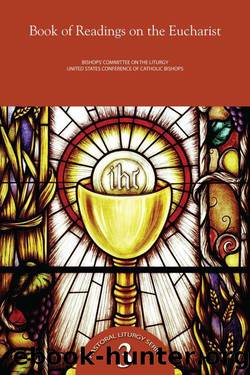Book of Readings on the Eucharist by United States Conference of Catholic Bishops (USCCB)

Author:United States Conference of Catholic Bishops (USCCB) [Bishops, United States Conference of Catholic]
Language: eng
Format: epub
Publisher: United States Conference of Catholic Bishops (USCCB)
Published: 2012-04-11T07:00:00+00:00
The Sunday Eucharist: An Assessment
Understanding what the Sunday Eucharist is, as the paradigm of dies Domini and dies Ecclesiae, we might well ask ourselves, How can we make the Sunday celebration of the Eucharist more responsive to its identity?
In his apostolic letter, Pope John Paul II invited us to an examination of conscience of sorts in relationship to several aspects of Sunday Mass. Allow me to briefly address each in turn.
1. Liturgy of the Word
The first challenge given to pastors and liturgists by the Holy Father in Dies Domini is found in paragraph 40: âIn considering the Sunday Eucharist more than thirty years after the Council, we need to assess how well the word of God is being proclaimed and how effectively the People of God have grown in knowledge and love of Sacred Scriptureâ (my emphasis; the Second Vatican Councilâs Constitution on the Sacred Liturgy, Sacrosanctum Concilium, speaks of âsuavis et vivus Sacrae Scripturae affectus,â no. 24). The Holy Father went on to say that this reassessment has two aspects: the proclamation and the approbation of the Word of God. His challenge is not dissimilar to what we hear in the introduction to the revised Lectionary for Mass, when it quotes from St. Jerome: âNot to know the scriptures is not to know Christ.â
The encounter with the word is an encounter with the Lord, and proclaiming that word is proclaiming the Lord. Knowing that word is knowing him. Being transformed by that word is being transformed by him. Being made into the image of that word is being made into his image. Hear the Council Fathers almost forty years ago: the Scriptures âpresent Godâs own Word in an unalterable form, and they make the voice of the Holy Spirit sound again and again in the words of the prophets and apostles.... In the sacred books the Father who is in heaven comes lovingly to meet his children, and talks with themâ (my emphasis).3
Our reading, proclaiming, and hearing the Word of God, then, is an intimate encounter between God and his people. The Father, speaking his Eternal Word, made flesh in our time: reaching down from heaven into our earthly existence and speaking with us, teaching us the mysteries of life.
And precisely because of the intimacy of this encounter between God and his beloved children, the Word of God can never be properly read by the eyes alone, or heard by the ears alone. It is, to paraphrase a famous author, âonly with the heart that one hears rightly.â Pope John Paul II once spoke of this in an ad limina talk to the bishops of the northwestern United States:
Active participation certainly means that, in gesture, word, song and service, all the members of the community take part in an act of worship, which is anything but inert or passive. Yet active participation does not preclude the active passivity of silence, stillness and listening: indeed, it demands it. Worshipers are not passive, for instance, when listening to the readings or the homily, or following the prayers of the celebrant, and the chants and music of the liturgy.
Download
This site does not store any files on its server. We only index and link to content provided by other sites. Please contact the content providers to delete copyright contents if any and email us, we'll remove relevant links or contents immediately.
Christian Ethics by Wilkens Steve;(860)
Christian Ethics for a Digital Society by Kate Ott(779)
Fearfully and Wonderfully Made by Philip Yancey & Paul Brand(771)
God and the Multiverse by Victor J. Stenger(676)
Numbers by Ronald B. Allen(640)
How to Read Slowly by James W. Sire(617)
Christian Ethics: An Introduction to Biblical Moral Reasoning by Wayne Grudem(598)
The City of God by Saint Augustine & Marcus Dods(591)
Monastic Archaeology by Unknown(568)
Morality by Jonathan Sacks(567)
The Technological System by Jacques Ellul(550)
Amish Grace by Donald B. Kraybill & Nolt Steven M. & Weaver-Zercher David L(535)
Death of the Doctor by Unknown(527)
The Disabled Church by Rebecca F. Spurrier;(523)
Jesus: A New Vision by Whitley Strieber(522)
Children of Lucifer; The Origins of Modern Religious Satanism by Ruben van Luijk(513)
Critical Writings by Joyce James;(503)
Redeeming Sociology by Vern S. Poythress(488)
The Church in the Early Middle Ages by G.R. Evans(478)
